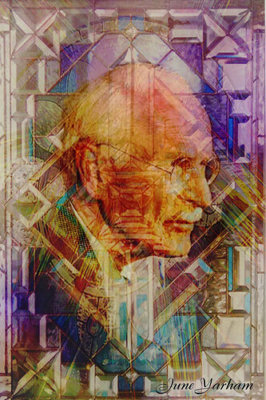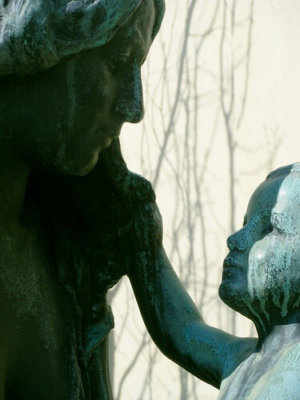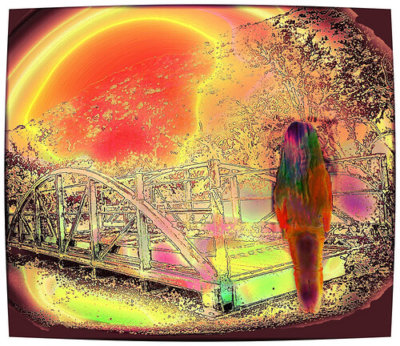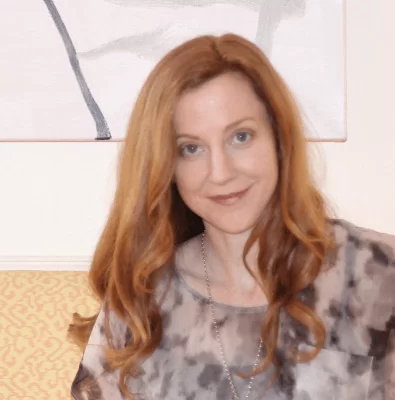The Collective Unconscious – What is It, and Why Should You Care?

By: peter
by Andrea M. Darcy
The collective unconscious was a radical concept in its time.
Created by Carl Jung, it was the idea that separated Jung from the theories — and ultimately friendship – of Sigmund Freud.
While the alliance between Freud and Jung didn’t stand the test of time, Jung’s idea itself ultimately did, and the collective unconscious arguably became his most important contribution to psychology.
Although now couched in other theories and rarely attributed to Jung, the ideas first set forth by the collective unconscious are now an acceptable and highly useful part of many different kinds of scientific thought.
What is the collective unconscious?
Jung proposed that the collective unconscious is a layer of our unconscious mind we come into this world containing, that connects each one of to the history of thoughts and behaviours of all of mankind.
The idea crystallised for Jung after a dream that the was in a house, with the first floor well decorated and organised (conscious personality), then the ground floor more medieval and dark (personal unconscious). And finally a basement with signs of primitive culture and with ancient skulls in it (collective unconscious).
A modern analogy could be to imagine the collective unconscious rather like an inherited ‘database’, or like the computing ‘Cloud’. It is a vast field of information going back to ancient times that we can all access should we so need, and that allows us to have experiences that are typical of humanity.
What does the collective unconscious contain?
The collective unconscious contains what are called ‘archetypes‘.

By: jon jordan
Archetypes are universal concepts we seem to instinctively know, or what Jung described as “identical psychic structures common to all”.
Archetypes mean that we can have the same thoughts and ideas as other people we have never met even though they come from an entirely different background and culture.
An example would be the mother child relationship. Nobody tells us what a mother is, but we react in a certain way to a mothering figure, regardless where we were born in the world or what our culture, religion, or race is.
If this is all true, then why are we not perfectly intelligent and more alike?
For starters, it’s in the word ‘unconscious’ — the collective unconscious, works in a way that is beyond our mental control.
The archetypes contained in the collective unconscious are also essentially dormant. As Jung said, they can be seen as “the deposits of all our ancestral experiences, but they are not the experiences themselves”.
Like blueprints, archetypes only become experience when we unconsciously choose to act them out, triggered by something that happens to us, like a challenge or life crisis. And because what happens to each one of us is unique, we will use and manifest parts of the collective unconscious in a way that is individual as well.
Why did Freud hate the idea of the collective unconscious so much?
It’s not that Jung didn’t share Freud’s idea that personal experience shapes us. It’s just that he didn’t believe, as Freud did, that we arrive like a blank slate into the world and are only a product of our experiences, meaning each thing in our psyche is unique to us.
Jung found this viewpoint limiting and decided we arrive into the world with the collective unconscious already in place. We have an ‘archetypal potential’ that we can choose to activate and develop or not.
So for Freud, personal experience exists to develop who we are. For Jung, personal experience exists to develop what is already within us.
How did Jung come up with the idea of the collective unconscious?

By: garlandcannon
Dreams played a big part in Jung forming his theory of the collective unconscious. From childhood he was fascinated by an instinct that he was connected to something bigger than himself, and he noticed that his dreams contained things were beyond his own knowledge and experiences.
Later, Jung worked in a psychiatric hospital where he had the chance to study up close patients with schizophrenia and make his observations scientific. He noticed that within the hallucinations and delusions of his patients were images and symbols that were bigger than their possible personal experiences, and even had mythic proportions.
Was it a crazy idea, or is there some truth to it?
Similar theories to Jung’s are now respected in modern branches of psychology and science, meaning that Jung’s idea was ahead of his time.
An example is ethology, a behavioural biology that involves studying animals in their habitats. It has been discovered that every species contains encoded in it’s central nervous system what is called “IRMs”, innate releasing mechanisms. These are seen as an inherited set of behaviours that become active when faced with the right stimulus. An example of this is baby gulls, who see the red spot on their mother’s beak and peck at it so she gives them food.
So how is the collective unconscious of any use to me?
Jung felt we can directly access the collective unconscious via our dreams. We can remember our dreams, look for the archetypes, then interpret the wisdom the archetype offers. For example, if we dream of an old man talking to us, we can decide it is a sign we are on the right track in life and approaching our personal inner wisdom.
The collective unconscious is also a way to feel connected, instead of separated, from others in the world. We might come from different places and viewpoints, but we all long for a mother, feel fear when we think of death, and seek out heroes. And we all dream in archetypes at night.
Do you still have a question about Jung and the collective unconscious? Or want to share a viewpoint? Use the comment box below.
 Andrea M. Darcy is a health writer trained in counselling who loves Jung. Find her @am_darcy
Andrea M. Darcy is a health writer trained in counselling who loves Jung. Find her @am_darcy





I really liked this explanation of Jung who was indeed a man before his time. I do a form of hypnotherapy which allows patients to access and change their personal versions of many of Jung’s archetypes, and it is amazingly effective.
Thanks Alicia, it sounds interesting.
thank you i really enjoyed reading this ^_^
Glad to hear!
Are languages stored in our collective consciousness? Can we pull from that wisdom and activate speaking a different language from the one we speak. I’m curious to know because sometimes I feel there’s a great deal of knowledge and wisdom that floats to the surface and I find myself “knowing” and understanding things I haven’t been exposed to in my lifetime.
Hi Chelena, who knows. The collective consciousness is, after all, a theory, an idea, not a thing we can go into and see under a microscope or have any proof over. But we’d imagine Jung would say no, because the collective consciousness tends to function with images and metaphor over words. And in the brain we have language centres.
I am still trying to comprehend the collective unconscious while studying world mythology. How can I relate the hero to the collective unconscious? Hercules and Beowulf, the Greek demi-god and the super strong and courageous epic hero?
SAM
Hi Samantha, we approach the collective consciousness from a therapeutic angle, so we can’t offer expertise on mythology. But to point out that Jung believed the collective unconscious includes all the archetypes we commonly know and share. And that a hero is an archetype. Have you come across Caroline Myss? She wrote a very famous book on archetypes. https://www.myss.com/free-resources/sacred-contracts-and-your-archetypes/archetypes/. Best, HT.
I believe that I am contacting the ‘Collective Unconscious’ through my form of ‘Tonal Meditation’ which I have developed from Transcendental Meditation. Instead of using a mantra to focus/empty the mind, I use a tone in my head, which if increased in pitch, deepens my meditative state. I believe, that the ‘vacuum’ thus created if filled by the ‘Creative Unconscious’…….
Hi James. The Collective Unconscious is a theory over a proven palpable thing. But all great spiritual traditions ascertain that we are connected over separated. And all forms of meditation, if practiced enough, lead to a goal of feeling of unity with all things over separation and individuality and difference. Jung might argue (we can only guess) that it is not a question of a ‘vacuum’ and a space being filled. The collective unconscious is always present, it’s just that you’ve developed the presence to sense it. It could be more a case of turning off the radio of thought in order to sense what was always present. Best, HT.
Was quietly recording in a note book dreams I’d had the previous night and like a bolt out of the blue I had the sudden answer to a puzzling question that I had not thought of for many , many years . My troubled and narcissistic mother had alluded to a terrible event that had occurred in her childhood – under her house involving a male cousin, Joe . It was never to be spoken of .I was about 10 at the time .
And now I knew in a flash it had involved either rape or some sort of sexual encounter . My mother is dead and I am in my seventies . But how and why did did I have access to this ?
Hi Julia, the brain is really still as mysterious to science as outer space, despite great amounts of research. When it comes to things like memories and the collective consciousness there are are many theories. Perhaps at some point when you were a very young child she did make more comments and you didn’t remember, perhaps you overheard something. Perhaps this is your logic brain putting together thoughts over actual ‘fact’. Perhaps this is what happened and you are somehow able to connect to your mother. We simply can’t say. For example, even in hypnotherapy there is no proof that the memories that come up during a session are ‘fact’, or what they person needs to believe to make sense of the world. The latter matters more anyway as they help the client feel better and navigate their current life better. So what matters to us is not actually having the ‘right’ explanation for this, but asking if this feels right to you, and helps you navigate your own feelings around your Mother. Or is something that troubles you or still directly affects you. You say that your mother was narcissistic. If you still suffer anxiety and relating issues due to a troubled past, or struggle to overcome your anger and upset around the mothering you received, it’s never to late to seek some counselling or therapy. Best, HT.